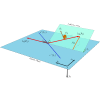主权入侵:民粹主义与对国际货币基金组织的态度
IF 2.4
1区 社会学
Q1 INTERNATIONAL RELATIONS
引用次数: 0
摘要
全球民粹主义反弹被认为是对多边秩序的威胁,但它对个人对国际组织(如国际货币基金组织)态度的影响尚未得到充分研究。我们将对国际货币基金组织和民粹主义研究的见解结合起来,以三个命题为中心建立了一个理论框架。我们认为,民粹主义者应该比非民粹主义者更倾向于将经济问题归咎于IMF,但这种影响在很大程度上取决于主权入侵,当IMF计划存在时,随着该计划变得更加繁重,这种影响就会升级。相比之下,民粹主义政客找IMF的替罪羊应该基本上是无效的。通过分析来自整个欧盟的调查数据和希腊的一项原始调查实验,我们发现了对每个论点的支持。这篇论文促进了对IMF党派政治的理解,并表明民粹主义浪潮对国际秩序的影响比通常认为的要复杂得多。本文章由计算机程序翻译,如有差异,请以英文原文为准。

Sovereignty Intrusion: Populism and Attitudes toward the International Monetary Fund
The global populist backlash is considered threatening to the multilateral order, but its impact on individual attitudes toward international organizations, like the International Monetary Fund (IMF), is understudied. We bridge insights from research on the IMF and populism to develop a theoretical framework centered on three propositions. We argue that populist individuals should be more prone to blame the IMF for economic problems than non-populists, but that this effect is highly conditional on sovereignty intrusion, escalating when an IMF program exists and as the program becomes more onerous. In contrast, IMF scapegoating by populist politicians should be largely ineffective. Analyzing survey data from across the European Union and an original survey experiment in Greece, we find support for each contention. The paper advances understanding of the partisan politics of the IMF and shows that the implications of the populist wave for international order are more complex than often assumed.
求助全文
通过发布文献求助,成功后即可免费获取论文全文。
去求助
来源期刊

International Studies Quarterly
Multiple-
CiteScore
4.10
自引率
7.70%
发文量
71
期刊介绍:
International Studies Quarterly, the official journal of the International Studies Association, seeks to acquaint a broad audience of readers with the best work being done in the variety of intellectual traditions included under the rubric of international studies. Therefore, the editors welcome all submissions addressing this community"s theoretical, empirical, and normative concerns. First preference will continue to be given to articles that address and contribute to important disciplinary and interdisciplinary questions and controversies.
 求助内容:
求助内容: 应助结果提醒方式:
应助结果提醒方式:


